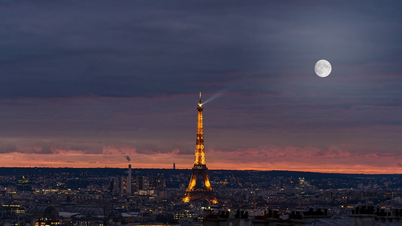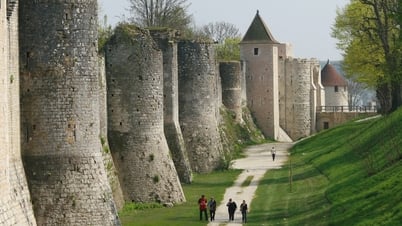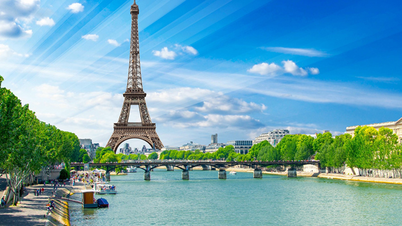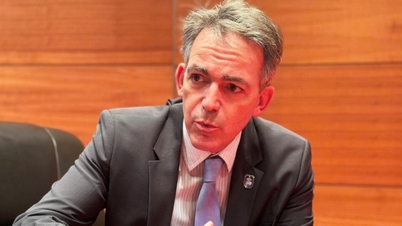 |
| Riots in France: Debt-ridden economy - a narrow window for President Macron. (Source: Getty Images) |
During the riots, thousands of people were arrested, an estimated 6,000 cars were burned or destroyed, and countless stores were looted or vandalized.
Demonstrations have become a "specialty" of the French, they happen all the time, from small things to major national issues. Even the French humorously admit that "we are champions of demonstrations".
French travel websites or websites for international students all have additional sections advising people to be mentally prepared or have backup plans for bad situations that may suddenly occur.
According to History Professor Michel Pigenet, violence in protests is not a typical French tradition, but he has noticed that violence in protests has continued to increase and become more dangerous since 2000.
The Sorrow of France
If the protests following the death of teenager Nahel M. revealed a French society that is still unstable, then the hundreds of protests and riots in the first months of 2023 against the law to increase the retirement age to 64 years old showed a France facing economic difficulties.
Europe's second-largest economy is mired in debt. The riots won't bankrupt the economy, of course, but they are a watershed moment.
It remains to be seen how long the worst of the riots will last, or whether violence is at risk again, as the French saw in 2005. However, one thing is certain and clear: petrol bombs and “Molotov cocktails” are taking a heavy toll on the French economy.
At its peak, 1,500 cars were set alight each night, according to Interior Ministry data. Even on a “quiet” Sunday, the number of vandalized vehicles was in the hundreds. An estimated 500 buildings were set ablaze on Thursday night.
Initial estimates from insurance companies suggest the damage could be as high as 100 million euros. But the final bill will of course be much higher. Shops were closed all weekend, including along the Champs-Élysées.
Nighttime curfews and travel restrictions will take a heavy toll on the restaurant business, and in many countries, including the UK, governments have issued travel advisories warning tourists about visiting France during the peak summer season.
This is notable, given that France is the world’s top tourist destination, with tourism accounting for 10% of GDP. The “total cost” of the current unrest will depend on how long the unrest lasts, with the longer it lasts, the worse it gets.
An economy that is no longer sustainable
In the past, French governments have bought off civil unrest by increasing public spending. After three weeks of rioting in 2005, at its peak, former President Nicolas Sarkozy promised a “Marshall Plan” for the suburbs, with billions of dollars committed to better housing and transport.
Following the “gilets jaunes” (yellow vest) protests in 2019, President Macron cut fuel taxes and increased subsidies to ease the frustration of protesters who were mainly in rural areas.
Observers predict that, in the coming days, we can probably expect to hear about some big spending commitments to “fix” the crisis.
But the problem is that Paris is stuck trying to find a way out of this mess. Over the past decade, its finances have deteriorated dramatically. The UK may be in dire straits, but France is in even worse shape. France’s total debt-to-GDP ratio has reached 112% of GDP, compared to 100% in the UK and 67% in Germany. And it is forecast to continue rising for the rest of the decade.
The budget deficit is forecast to hit 4.7% of GDP this year, even as the economy recovers from the Covid-19 pandemic, and is expected to hit 4.4% of GDP next year.
The French economy has one of the largest structural deficits in the developed world. Government spending consumes nearly 60% of GDP and, with a tax-to-GDP ratio of 45%, France ranks second among OECD countries in the amount of money the government takes out of the economy.
There is no scope for higher taxes, nor can it hope to borrow much more. France has overtaken Italy to become the world’s third-largest national debtor – at least measured by debt rather than as a percentage of output – and is behind only the much larger economies of the US and Japan.
Rating agencies have also expressed concern about France's rising debt levels. In May, Fitch downgraded France's debt to "AA-". "Political gridlock and sometimes violent social movements pose risks to President Macron's reform agenda and could create pressure for a more expansionary fiscal policy or risk reversing previous reforms," the agency noted.
President Macron has almost succeeded in reforming the pension system. Despite hundreds of protests, Paris has finally had to bite the bullet and raise the official retirement age to 64, using a constitutional privilege (Article 49.3) that allows the bill to be passed without a vote in the National Assembly, and will be implemented later this year.
But now his administration is struggling to respond to the riots that have lasted since last weekend.
Analysts say that unlike his predecessors, President Macron cannot respond to a weekend of riots with a new round of additional spending. He does not have the financial space to do so.
He is even planning to cut spending over the next few years to try to ease the current situation and bring the budget back into balance. But that is expected to only make the problems in the most deprived areas worse.
Riots, arson and unrest are weighing heavily on the French economy and creating a need for more spending, at a very difficult time for President Macron's government.
The worst may not happen this month or in the next six months – but the riots have exposed a French economy that has become unsustainable and needs radical reforms.
Source



![[Photo] Party Committees of Central Party agencies summarize the implementation of Resolution No. 18-NQ/TW and the direction of the Party Congress](https://vphoto.vietnam.vn/thumb/1200x675/vietnam/resource/IMAGE/2025/10/27/1761545645968_ndo_br_1-jpg.webp)
![[Photo] The 5th Patriotic Emulation Congress of the Central Inspection Commission](https://vphoto.vietnam.vn/thumb/1200x675/vietnam/resource/IMAGE/2025/10/27/1761566862838_ndo_br_1-1858-jpg.webp)

![[Photo] National Assembly Chairman Tran Thanh Man receives Chairman of the House of Representatives of Uzbekistan Nuriddin Ismoilov](https://vphoto.vietnam.vn/thumb/1200x675/vietnam/resource/IMAGE/2025/10/27/1761542647910_bnd-2610-jpg.webp)








































































































Comment (0)